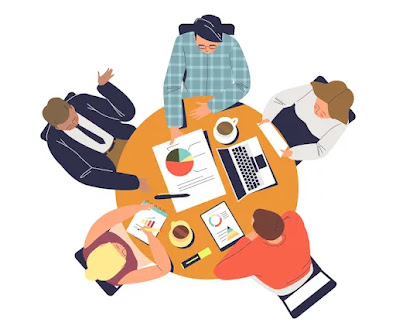Dealing With Social Loafing
When I was in 6th grade, way back in the 1980s, an odd educational fad swept into the rural school district where I lived. Suddenly we found ourselves being put into groups on a daily basis for our various subjects. Whether it was science, history, English, or social studies, we were told to find groups or to count off and form groups around numbers, then do whatever assignment there was. I hated it. Always there was at least one who was highly motivated and took charge, one or two who helped with whatever the leader(s) said was needed, and a slacker or two. I hated being the primary one pushing to get things done, and I also despised being the lazy member. You would think that a person could simply decide not to be lazy, but apparently that's not how it works. In some groups I simply got the feeling that everyone else had a job to do and there was no place for me, and that my contribution wouldn't mean anything. Still, I felt guilty every time it happened. This dynamic plays out often in academic settings, but can happen anywhere, including at work. Here I'll explore some ways to mitigate this phenomenon in hopes it can help you improve teamwork, particularly in business settings.
Before anything else, though, a word about terminology. While I've been talking about 'group work' here, it's important to understand that there is a real difference between a group and a team. A group is simply a collection of individuals, and the actions of individual members can have an impact on the other members of the group. There's nothing really beyond a group than that. A team, however, is a collection of individuals who work together toward a common goal, sharing responsibility for any outcomes. A team has a purpose and mission with specific goals. Thus, a collection of people riding an elevator to the lobby is a group, although a temporary one. A team, on the other hand, might be a group on an elevator that has become stuck, and they have to work together to get out. More clearly, we see teams in sports and other activities where collective effort and coordination is required.
In a business setting, particular the sort that I find myself in now as a program manager, social loafing (as it is known in the field of organizational behavior) is a less pronounced phenomenon. You won't usually see a team member literally napping while everyone else works, as can be the case in high school or even university classes. However, a degree of social loafing can take place.
First, if the team is too big for the project at hand there won't be enough to do to keep people engaged. Be certain that you only pull in people who need to actively contribute. Others with specific subject matter expertise but who aren't needed beyond that can be consulted from time to time as needed, but not identified as team members. This also frees them up to do other work, as there will most likely be more than one project in which they need to be engaged at a time anyway.
Second, define each team member’s role for the entire team to understand. This brings clarity and accountability. If there's a kickoff I would make sure we get a quick introduction, and either in that meeting or the next one create a table listing out names, titles, and function for the group. I do this in Confluence so that everyone on the team has access to it, and it's worth reviewing periodically.
Third, ensure that the tasks each team member has to carry out will keep them engaged. Too little to do, or low effort required, can decrease the sense of contributing and diminish motivation.
Fourth and finally, recognize the contributions of each member. If any are overlooked, and especially if this happens more than once, the tendency will be for disengagement. People need to feel useful and valued. I strongly recommend acknowledging individual contributions when they are completed, rather than waiting. This keeps people motivated and avoids the risk of you forgetting to bring it up later. For example, if someone gets a much-needed server set up, or fixes a video transcoding issue that's been causing serious problems for the team, point it out at the very first chance. You can start with a celebratory mention on whatever chat system the team uses, then highlight recent contributions at the start of the next meeting.
Fortunately for me, the fad of group work passed as soon as the superintendent moved on to another school district. Although we continued to have this from time to time in my classes through junior high and high school, it was no longer a frustrating daily reality. Through the years I've worked with a number of different teams, in college and at work. Some have been more highly functional than others, but in general I've had the good fortune to work with some very intelligent, talented people. At the same time, the suggestions above have helped me as a project/program manager to keep people engaged in teamwork and making progress. Perhaps they'll be of use to you as well.



